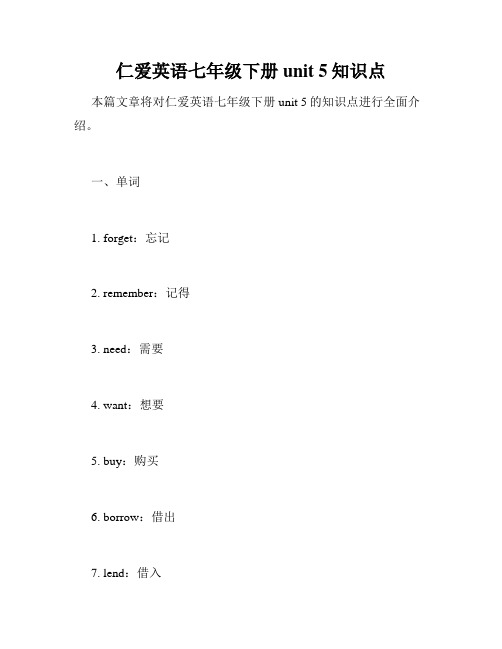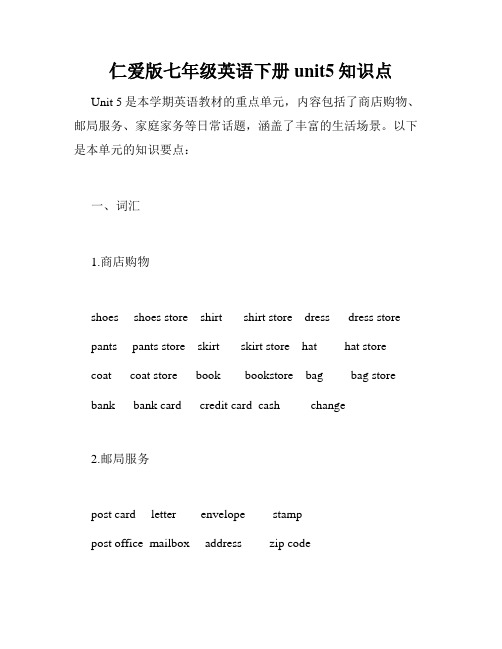仁爱英语七年级下Unit5-Topic1知识点归结
仁爱英语七年级Unit5Topic1重点归纳

Unit5 Topic1重点归纳1.by+交通工具单数名词,中间不加限定词,表示乘坐某种交通工具,在句子中作方式状语,放于句末。
2.表示乘坐某种交通工具,有以下四种表达:(1)by+交通工具;(2)take a/the+交通工具;(3)in/on+a/the+交通工具;(4)walk/ride/drive/fly to+地点名词3. go to school by bus/on a bus =take a bus to school坐公共汽车去学校4. go to school on foot=walk to school步行去学校5. go to the zoo by car/in one’s car=drive to the zoo开车去动物园6. go to Beijing by plane=fly to Beijing坐飞机去北京7. 频度副词always, usually, often, sometimes, seldom, never置于行为动词前,be动词、情态动词和助动词之后。
8. It’s time for (doing) sth.=It’s time to do sth. 该做某事的时间了9. 对方式提问用How(怎样);对频率提问用How often(多久一次);对具体的时间提问用What time(什么时候/几点钟),常用at+“具体时间”回答。
10.do one’s homework 做家庭作业11.for a short time一会儿12.know about/of sth. 了解……的情况13.be over结束14.in one’s free/spare time 在某人的空闲/业余时间15. 辨析:watch/look/seewatch强调聚精会神地看,常指看动态的食物;look强调看的动作,后接宾语时加at再加宾语;see 强调看的结果,表示看见某物。
e on加油17.on weekdays在工作日18.watch TV看电视19.would like/want to do sth.想做某事。
七年级英语(仁爱版)下册 Unit-5-Topic-1 知识点总结语言点归纳

知识点七年级英语(仁爱版)下册Unit-5-Topic-1语言点归纳Unit 5 Topic 1I 重点词汇和短语gate, by, always, plane, train, ship, boat, Ms., grandmother, group, weekday, early, bird, catch, seldom, walk, never, sometimes, ride, park, watch, TV, homework, life, American, or, few, day, rest, play, basketball, swim, ball, game, read, listen, library, once, twice, week, every, must, first, music, begin, while, wall, bed.the same to, come on, on foot, by plane, know about, for a while, watch TV, do (one’s) homework, have lunch, at school, have a rest, be different from, go swimming, listen to, go to bed, go to school, have classes.II 语言点Section A1. a) ---Happy New Year! ---- The same to you! / You, too. 新年快乐!也祝你新年快乐!b) ----Happy birthday! -----Thank you! 生日快乐!谢谢!2. How about you? = What about you? 你怎么样?3. Oh, your new bike looks very nice! 哦,你的新自行车看起来很好看。
仁爱英语七年级下册Unit 5 知识点

仁爱英语七年级下册unit 5知识点本篇文章将对仁爱英语七年级下册unit 5的知识点进行全面介绍。
一、单词1. forget:忘记2. remember:记得3. need:需要4. want:想要5. buy:购买6. borrow:借出7. lend:借入8. pay:支付9. cost:花费10. heavy:重的11. light:轻的12. thin:薄的13. thick:厚的14. long:长的15. short:短的16. small:小的17. big:大的18. hot:热的19. cold:冷的二、语法1. 情态动词情态动词包括can/could, may/might, must, should/ought to等,用于表示说话人的态度、意愿、可能性、推测等。
比如:I can swim.(我会游泳。
)You must finish your homework.(你必须完成作业。
)2. 定冠词和不定冠词定冠词the用于特指某一事物,比如the book(那本书);不定冠词a/an用于泛指某一个,比如an apple(一个苹果)。
3. 物主代词我、你、他、她、它等人称代词后面加上我的、你的、他的、她的、它的等词,就构成了物主代词。
比如:I lost my bag.(我丢了我的书包。
)4. 名词的复数在名词后面加-s或-es来表示复数形式,比如books(书)、boxes(箱子)。
5. 副词副词是用来修饰动词、形容词、副词和句子的。
常用的副词有often, always, sometimes等。
6. 数词数词是用来表示数目、数量的词语。
基数词表示数量,比如one(1)、two(2)等;序数词表示顺序,比如first(第一)、second(第二)等。
三、阅读理解这个单元包含了一篇短文,提供了购物建议。
阅读理解是考查学生字义理解能力的一种方式,要求同学们读懂短文,并理解其内容。
四、写作技能写作技能涉及到学生组织语言,进行人际交流的能力。
仁爱版英语七年级下册 Unit5_Topic1_短语句型归纳

Unit5 Topic1 短语句型归纳【短语集萃】the same to对……也一样come on快点儿;加油;来吧on foot走路,步行go to school 去上学on weekdays 在平日do (one’s) homework 做家庭作业watch TV 看电视at school在学校;在上课go to bed睡觉play basketball打篮球go swimming 去游泳listen to 听once a week 每周一次have lunch 吃午饭in one’s free time 在某人的业余时间the Great Wall 长城have classes 上课talk to 和……交谈be different from与……不同【典句必背】1. —Happy New Year! 新年快乐!—The same to you. 也祝你新年快乐!2. —How do you usually come to school? 你通常怎样来学校?—I usually come to school by subway.我通常乘地铁来学校。
3. Oh, it’s time for class. Come on! 噢,上课时间到了。
快点!4. —Michael, what time do you usually get up on weekdays? 迈克尔,你平日通常几点起床?—I always get up at about six o’cl ock. 我总是6点左右起床。
5. The early bird catches the worm. 早起的鸟儿有虫吃。
6. Maria sometimes takes the subway home. 玛利亚有时候乘地铁回家。
7. 一How often do you come to the library? 你多久来一次图书馆?—Three times a week.一周三次。
七下unit5 topic1主要知识点

1. the same to you = you too 也祝福你……(用于公共节日,假日等别人向你祝福时回应对方)2.look(1)v.+ n /名词性词组看Look at the blackboard.(2)系动词+形容词看起来……She looks very nice.3. --How do you usually go to school? (how询问别人的交通方式)--I usually go to school by bike.by+交通工具构成介词短语=in/on /take + a/an/the/one’s + 交通工具注意:on foot 步行 on horseback 骑马4.It’s time for sth/doing sth. 是做某事的时候了=It’s time to do sth.It’s time for breakfast. = It’s time to have breakfast = It’s time for having breakfast.It’s time for sb. to do sth. 到某人该做某事的时候了It’s time for me to have lunch.5.频率副词:never 决不, seldom 很少, sometimes有时候, often 常常, usually 通常, always 总是。
频率度:never < seldom < sometimes < often < usually < always(1)频度副词在句中的位置:①行为动词之前 I often walk to school.②系动词、助动词或情态动词之后 Mary is always late for school.③为了突出和强调,置于句首 Sometimes he goes to school on foot.(2)对于频度副词的提问--Jim always goes home by bike.--How often does Jim go home?6.表数量的不定代词(1) few 几乎没有,极少(表否定)(2) a few 少数几个,一些(表肯定)代替或修饰可数名词,在句中作主语、宾语、定语She is new here, so she has few friends here. (几乎没有)She is new here, but she has a few friends here.(有几个)(3) little 不多,几乎没有(表否定)(4) a little 虽少,但是还有一些,一点儿代替或修饰不可数名词,在句中作主语、宾语、定语Hurry up, there is little time left.(没有时间)There is a little water in the cup. (一些水)7.have + a + 名词have a look 看一看 have a swim 游泳 have a meeting 开会Do they have a short break after lunch.8.in one’s free/spara time 在某人闲暇时9.play + 球类名词 play football/basketballplay + the + 乐器 play the guitargo + doing 表示去做某事 go fishing/shopping/swimming/skating10.一般现在时:表经常反复的动作,存在的状态或习惯性动作。
仁爱版七年级英语下册unit5知识点

仁爱版七年级英语下册unit5知识点Unit 5是本学期英语教材的重点单元,内容包括了商店购物、邮局服务、家庭家务等日常话题,涵盖了丰富的生活场景。
以下是本单元的知识要点:一、词汇1.商店购物shoes shoes store shirt shirt store dress dress storepants pants store skirt skirt store hat hat storecoat coat store book bookstore bag bag storebank bank card credit card cash change2.邮局服务post card letter envelope stamppost office mailbox address zip code3.家庭家务clean clean up sweep mopwash laundry fold drydish do the dishes set the table clear the table二、重点语法本单元的语法重点是一般现在时和there be句型的运用。
1.一般现在时一般现在时通常用来表示反复发生的动作、习惯性的行为或者现在的状态。
它的构成方式是主语+动词原形+其他。
注意第三人称单数形式应该在动词后面加上“s”。
例如:I often go shopping on weekends. (我经常在周末去购物。
)She always buys books in the bookstore. (她总是在书店买书。
)2.there be句型there be句型用来表示某地或某处有某物。
当表示单数或者不可数名词时,应该用there is;当表示复数名词时,应该用there are。
例如:There is a bank in front of the bookstore. (书店前面有一家银行。
)There are some chairs in the classroom. (教室里有一些椅子。
仁爱英语七年级下重点短语及句型

Unit 5重点短语及句型Unit 5 Topic 11. the same to对…也一样2. come on 快点儿加油3.go…on foot=walk 走路步行4. go to school 去上学5. on weekdays在工作日6.do one’s homework做家庭作业7.watch TV看电视8.at school在学校9.go to bed睡觉10.play basketball 打篮球11.go swimming去游泳12. listen to听13. once a week每周一次14.twice a week 一周两次15.three times a week一周三次16.have lunch吃午饭17. in one’s free/spare time 在某人的业余时间18. the Great Wall长城19. have classes上课20.talk to sb 和某人交谈21.be different from 与…不同22. by subway坐地铁23. by plane坐飞机24. by train坐火车25. come …by bike=ride a bike骑自行车26.go…by bus=take a bus坐公共汽车27.after school放学后28. for a short time 一段短时间29. how often 多经常①--- Happy New Year! 新年快乐!---The same to you. 你也一样。
(新年快乐!)②--How do you usually come to school"你通常怎样来上学的?--I usually come to school by subway.③ Oh, it’s time for class. 噢,是时候上课了。
④--How do you usually come to school"你通常怎样来上学的?回答可以用go/come...by+交通工具来回答。
初中英语 仁爱7下Unit 5 Topic1 知识点

Unit 5 Topic1 知识点重点单词1.大门2.乘(车等);靠近3.总是,一直4.快点儿;加油5.步行6.飞机7.火车8.船,轮船9.小船,轮船10.平日11.早的12.鸟13.捉住;接住14.有时15.很少;不常16.步行;散步17.决不,从来没有18.骑(自行车、马等)19.公园20.观看;注视21.电视;电视机22.看电视23.电影24.开始25.在学校;在上课26.在……后27.床28.篮球29.游;游泳30.听,仔细听31.音乐;乐曲32.图书馆,图书室33.周;星期34.一次;从前35.两次;两倍36.伟大的,极好的37.墙38.长城39.生活;生命40.美国人41.或者;否者42.结束;穿过43.在…上面44.更多的;更多45.谈话重点短语1.go …on foot = walk ( to )…2.at the school gate在学校大门口3.on weekdays在平日 ,在工作日4.on weekends=on the weekend在周末5.You are right. = That’s right. 你是对的。
6.play soccer 踢足球7.see a movie 看电影8.get up 起床9.after school 放学后10.after class 下课后11.after breakfast / lunch / supper12.早餐 / 午餐 / 晚餐后13.at school 在学校、在上课14.play soccer/basketball 踢足球/打篮球15.go swimming/fishing 去游泳/钓鱼16.listen to music 听音乐17.watch TV 看电视18.d o one’s homework 做作业19.go to the zoo/ park 去动物园 / 公园20.read books/a book 读书21.in o ne’s free time在某人空闲时间22.have a rest 休息一下23.meet friends 拜访朋友24.once/twice/three times a week 一周一/两/三次25.very often 经常26.every day 每天e to the library 来图书馆28.时间表达:i.8:00 eight o’clockii.9:05 nine o fiveiii.10:15 ten fifteen / a quarter past teniv.11:30 eleven thirty / half past elevenv.12:45 twelve forty-five/ a quarter to onevi.17:50 seventeen fifty / ten to eighteen29.go to bed 上床睡觉30.talk with / to sb.与某人谈话31.at school 在学校、在上课32.go to school 去上学33.and so on ……等等34.go to…on foot= walk to… 步行去…35.go to…by bike = ride a bike to… 骑自行车去…36.go to…by car = drive a car to… 开车去…37.go to…by plane = fly to… 乘飞机去…38.go to…by subway/underground39.= take the subway/ underground to… 乘地铁去…40.go to…by bus/train/ship/boat = take a bus/ train/ship/boat toi.乘公共汽车/火车/轮船/小船去…重点句型1. Happy New Year!The same to you.2. Your new bike looks very nice. Thank you.3. — How do you usually come to school?—I usually come to school by subway.4. —How often do you go to the library?—Once/Twice/Three times a week/Very often/Every day/Seldom(对划线部分进行提问)What time does the class begin? / What time do the classes begin?7. We have no more time. 我们没有更多的时间了。
- 1、下载文档前请自行甄别文档内容的完整性,平台不提供额外的编辑、内容补充、找答案等附加服务。
- 2、"仅部分预览"的文档,不可在线预览部分如存在完整性等问题,可反馈申请退款(可完整预览的文档不适用该条件!)。
- 3、如文档侵犯您的权益,请联系客服反馈,我们会尽快为您处理(人工客服工作时间:9:00-18:30)。
Unit5 Topic1
重点短语
1.on foot go …on foot = walk ( to )…
2.at the school gate在学校大门口
3.on weekdays在平日,在工作日
4.on weekends=on theweekend在周末
5.after school放学后
6.after class下课后
7.after breakfast / lunch / supper早餐/ 午餐/ 晚餐后
8.in ones free time在某人空闲时间
9.have a rest 休息一下
10.read books 读书
11.go swimming 去游泳
12.listen tomusic 听音乐
13.watch TV 看电视
14.do(one’s)homework做作业
15.go to the zoo/ park 去动物园/ 公园
16.once a week 一周一次
17.every day 每天
18.have classes 上课
19.for a little while一会儿
20.go to bed 上床睡觉
e on 快点,加油,来吧
22.get up 起床
23.alk with / to sb.与某人谈话
24.at school 在学校、在上课
25.go to school 去上学
26.and so on ……等等
重点句型
1.Happy New Year! The same to you.
2.Yournew
bike looks very nice. Thank you.
2How do you usually come to school? —I usually come to school by subway.
3.How often do you go to thelibrary? —Once/Twice/Three times
aweek/Very often/Every day/Sedom
4.The early bird catches the work. (谚语) 笨鸟先飞
5.Classes begin ateight. =Class begins at eight. What
time does the class begin? / Whattime do the classes begin?
6.We have no more time. 我们没有更多的时间了。
7.I have four classes in the morning and two in the afternoon. 我
早上上四节课,下午上两节。
